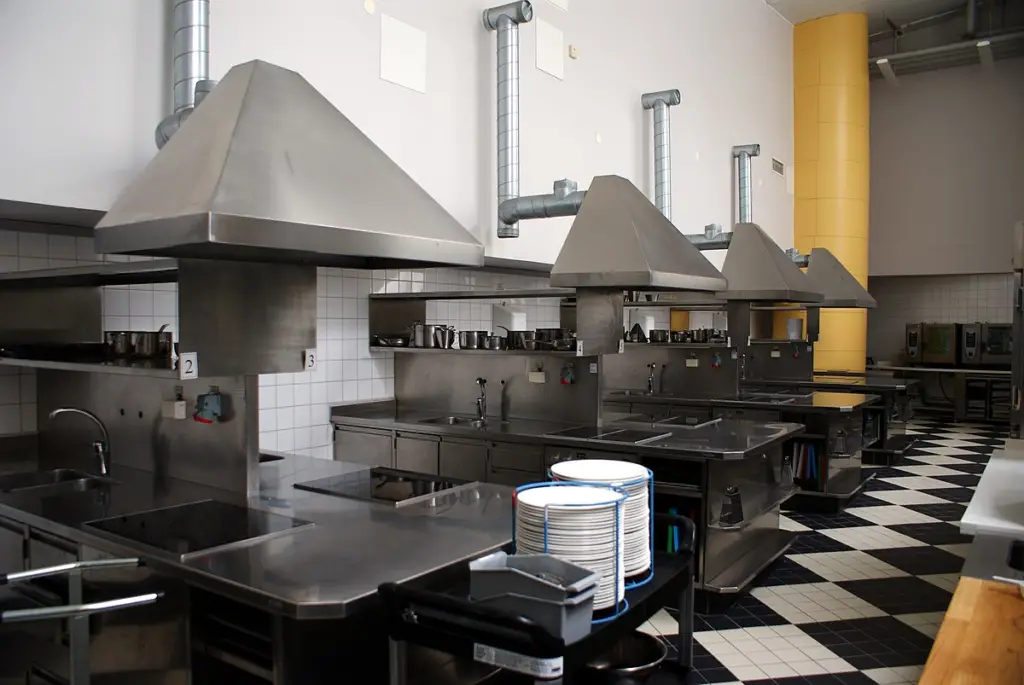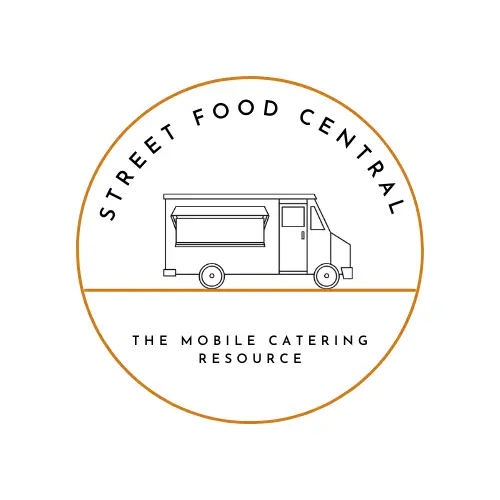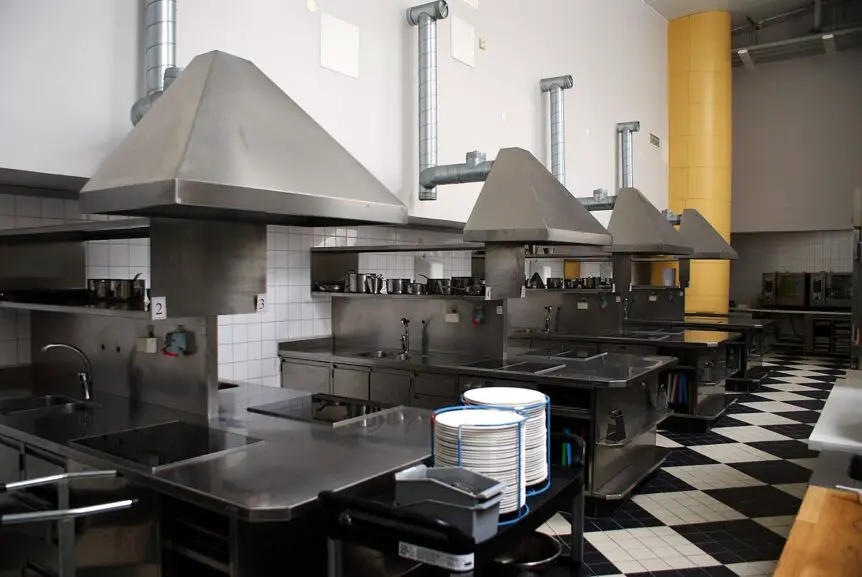Here are some things to consider when deciding if a commissary kitchen is right for you…

Picture the scenario… you are a food truck operator and your food is so popular that you can’t keep up with demand with the limited space that your 16ft food truck offers and you don’t have the resources to expand. That is where commissary kitchens come in.
Some of the main advantages of a commissary kitchen include being able to scale up production without the additional costs and access to professional networks where you can potentially get new business. And while using a commissary kitchen has many benefits there are also drawbacks, such as limited access, increased costs, and less control over the kitchen environment and equipment.
In this article, I will expand on the pros and cons of commissary kitchens so you can decide if it is the right choice for your business.
Contents:
- What is a commissary kitchen?
- The pros and cons of a commissary Kitchen
- Key takeaways
What is a commissary kitchen?
A commissary kitchen (also known as commissary food production or commissary food service system) is a shared commercial kitchen space that is used by multiple food businesses, such as food trucks, ghost kitchens, pop-up restaurants, event catering companies, concession stands, and small-scale food manufacturers.
The commissary kitchen typically includes space for food preparation and storage, commercial catering equipment for cooking, and additional facilities for cleaning, and is designed to meet the health and safety regulations in specific states or authorities. (It’s also worth noting that some states require food trucks to have a separate kitchen away from their main catering unit where food is prepared and cooked).
Food businesses can rent space in the commissary kitchen on an hourly, daily, weekly or monthly basis to prepare their food, store ingredients, and clean their equipment, which can be more cost-effective and efficient for food business than owning or renting their own commercial kitchen space.
Different types of commissionary (rentable kitchens)
Commissary kitchens is an umbrella term for the different types of rentable commercial kitchen space. here are a few different ones.
- Shared commercial kitchen – The most common type of kitchen where multiple food operators can use the commissary kitchen at once. Food operators are often given areas and times when they can use the kitchen. Renters split the costs and the space, making this a more cost-effective choice.
- Private Commercial Kitchen – An exclusive space that can be booked on a long-term basis for your sole use. This is good if you want to be more in control of access and the type of equipment there will be inside. However, this type of commissary kitchen can be the most costly.
- Restaurant’s Kitchen – Restaurants sometimes offer their kitchen space for rent outside their peak operating hours to other food businesses.
- Other types of Commercial Kitchens – Places like churches, social clubs, schools, and retirement communities typically have commercial catering facilities onsite that can be rented by food outside food businesses.
Related articles:
- 11 Reasons Food Trucks Are Better Than Restaurants
- Food Trucks Vs. Food Trailers: Which Is Best?
- How To Start A Ghost Kitchen From Home
The pros and cons of a commissary kitchen
There is a wide range of both pros and cons to using a commissary kitchen; here are some prods and cons to help you decide if a system like this is suitable for your business needs
Pros of using a commissary kitchen
1. Cost savings
Commissary kitchens allow you to save on the costs associated with running a food truck operation. This includes overhead expenses like utilities if you are cooking from home, long-term rental leases on commercial kitchens, and maintaining commercial catering equipment.
2. Health and safety compliance:
Commissary kitchens are required to adhere to strict health and safety regulations, which can be difficult and costly for individual food truck operators to manage on their own.
By using a commissary kitchen you can benefit from the established health and safety protocols, which can ensure that your food is safe for consumption.
3. Access to shared resources
Commissary kitchens often provide access to shared resources like equipment, storage space, and dishwashing facilities. This can be particularly beneficial for food truck operators with limited space or resources in their trucks.
4. Flexibility and scalability
Commissary kitchens have the space and resources to scale up your production capacity when needed. This means you can quickly scale up production during busy periods, like festivals or events, without having to invest in additional equipment or space.
5. Parking
Some commissionary kitchens offer overnight parking for food trucks which is a big bonus especially when some city authorities require it.
6. Professional network
Commissary kitchens provide opportunities for food truck operators to connect and network with other professionals in the food industry. This can lead to partnerships, collaborations, and shared learning opportunities, which can benefit their businesses in the long run.
7. Improved efficiency
Commissary kitchens are often designed with efficiency in mind, which means your business can benefit from optimized workflows, streamlined processes, and faster production times.
8. Reduced administrative costs
Commissary kitchens often handle administrative tasks like scheduling, staffing, and inventory management, which can be time-consuming and overwhelming for individual food truck operators. This can, therefore, save you both time and money.
9. Access to specialized equipment
Commissary kitchens often have specialized equipment, like industrial mixers, large ovens, pots, and commercial-grade fridges and freezers for storage, which can be expensive to purchase. This frees up cash flow for things like stock and product development.
10. Opportunity for experimentation:
Commissary kitchens can provide you with a space for experimentation and innovation to test out new recipes and cooking techniques in a professional kitchen before rolling them out to their customers.
Related articles:
Cons of using a commissary kitchen
1. Lack of control
Commissary kitchens are typically designed to accommodate a variety of different food operators, which means you may not be able to fully customize the kitchen to your specific business needs resulting in less control over your kitchen environment and equipment.
2. Limited access
Commissary kitchens often have limited availability, especially in busy urban areas. This can be an issue for example if you have dates booked in to feed large crowds of people at an event and you are unable to book the facilities you need to cook it.
Coordinating with the commissary kitchen and managing scheduling can be a challenge for food truck operators.
For instance, if the kitchen is fully booked, the food truck operator may need to adjust their production schedule, which can be disruptive to their business.
3. Increased costs
While using a commissary kitchen can save you some costs, you still need to pay for the costs of using the kitchen and its equipment. This additional business expense, on top of your other expenses, can quickly add up, if for example you are cooking a lot of food off-site and using the kitchen for more than 8 hours per day.
Additionally, there may be other expenses associated with a commissary kitchen such as cleaning and storage space fees.
4. Lack of brand recognition:
When using a commissary kitchen, food truck operators may miss out on opportunities to build their brand and customer base, as they are not visible in their own kitchen. This can make it more challenging to build a loyal customer base and establish a unique brand identity.
5. Distance from customers:
Commissary kitchens are often located outside of the primary service area for food trucks, which means that food must be transported to the truck’s service location.
This could lead to potential delays or additional logistical challenges, such as ensuring that the food stays at the proper temperature during transport.
Pros & cons summary:
| Pros of using a commissary kitchen | Cons of using a commissary kitchen |
|---|---|
| Cost savings | Lack of control |
| Health and safety compliance | Limited access |
| Access to shared resources | Increased costs |
| Flexibility and scalability | Lack of brand recognition |
| Parking | Distance from customers |
| Professional network | |
| Improved efficiency | |
| Reduced administrative costs | |
| Access to specialized equipment | |
| Opportunity for experimentation |
Key takeaways
Commissary kitchens are a good business model for food operators looking to scale their operators on a limited budget.
Some of the many advantages include giving you the ability to grow as a company whilst having more cash flow for things like stock and marketing and allowing you to work around other people in the industry which is good for building contacts and networks.
However, outsourcing some of your operators can come at a cost and some disadvantages include limiting your access to cooking over busy periods and the type of commercial catering equipment you might want to use for your business.
It’s, therefore, worth looking at your own individual business needs to determine if using a commissary kitchen makes sense for you. If you are a new food truck start-up, for example, you may not need one but if you are more established and are struggling to keep up with demand and need more space or the city you are operating in requires you to have one then may be a good choice.

